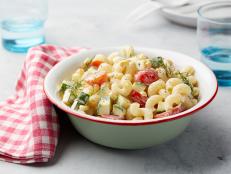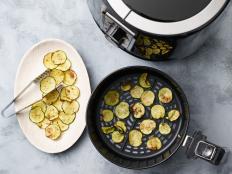Is Emotional Eating a Healthy Coping Mechanism?
Emotional eating isn't always bad, but when done to consistently numb certain feelings, it could be a sign of a problem.

Deagreez/Getty Images
Perhaps you’ve had a really terrible day at work and end up eating the entire pan of lasagna. Or you’re celebrating your birthday and grab cake and a few bottles of wine because what else is there to do during a pandemic? Emotional eating is a totally valid way to react to any range of emotions. When we think about big holidays, family gatherings and other special events, food is a celebration. Food can also help soothe our stress and emotional pain during challenging times.
Although there’s nothing wrong with seeking food to cope with feelings, it can become an issue if it’s something you’re doing consistently. Do you have other coping mechanisms aside from food or do you find that it’s your go-to for when you’re feeling certain emotions? If you’re experiencing the latter, here are some strategies that may be helpful.
Assess What Your Current Coping Mechanisms Are.
Having a variety of coping tools can help you sit with and process emotions. However, it’s important to distinguish whether these tools are numbing your emotions or actually helping you work through them. In my experience working with clients, consistently seeking food for emotional relief is usually done for the numbing effect.
Asking yourself a few mindful questions can help you identify productive or potentially harmful coping mechanisms: When thinking about what coping tools are right for you, consider whether or not these tools are helping you address your feelings and reach some level of clarity. How do you feel after you’ve put a specific tool into action? Do you feel guilty? Physically unwell? Do you feel relief and comfort? Is it a combination of a few things? Identify and focus on the tools that help you feel better after they’ve been put into action. Some of my favorite coping mechanisms are calling a close friend, pulling up a YouTube Afro-beats dance workout, going to sleep (works wonders), watching scandalous reality shows or crying it all out. Think about what combination works best for you and put that into action.
Nourish Yourself Throughout the Day.
You’d be surprised at how often emotional eating is confused with ravenous hunger. Perhaps you started off the day just fine, but forgot to eat after noon. Something unpleasant happens at the end of the day and of course you immediately resort to food because 1) you’re seeking relief, and 2) you haven’t had anything to eat all day! Eating throughout the day helps to keep blood sugars stable, which impacts our energy and mood. At the very minimum, make sure you’re eating three complete meals during the day with carbohydrates, protein, fat, and fiber. If you’re feeling hungry in-between meals, grab some snacks to help pull you through!
Show Yourself Some Compassion.
The good news is that every time you sit down for a meal, you have a new opportunity to practice mindfulness. Becoming more self-aware and unpacking difficult emotions is not easy, and you don’t need to have it all figured out each and every time. Show yourself some grace and keep it moving. Ate five slices of pizza and feeling sick to your stomach? It happened and tomorrow is another day to try a different approach.
As a registered dietitian/nutritionist and Certified Diabetes Educator, Wendy Lopez, MS, RDN, CDCES is passionate about accessible and culturally relevant nutrition education. She is the co-host of the Food Heaven Podcast, and the co-founder of Food Heaven, an online platform that provides resources on cooking, intuitive eating, wellness and inclusion. When not working on creative projects, Wendy also provides nutritional counseling and medication management to patients with diabetes.
*This article was written and/or reviewed by an independent registered dietitian nutritionist.
Related Links:

































